
Global Intellectual History
Scope & Guideline
Decoding the Legacy of Global Ideas
Introduction
Aims and Scopes
- Interdisciplinary Analysis:
The journal emphasizes the importance of interdisciplinary approaches, integrating history, philosophy, sociology, and cultural studies to provide a comprehensive understanding of global intellectual developments. - Global Perspectives:
It aims to transcend Eurocentric narratives, highlighting non-Western intellectual traditions and their contributions to global thought. - Historical Contextualization:
Papers often situate ideas within their specific historical contexts, examining how historical events influence intellectual movements and vice versa. - Focus on Marginalized Voices:
The journal is dedicated to exploring the perspectives of marginalized groups, including women, colonized populations, and religious minorities, thereby enriching the global intellectual discourse. - Conceptual History:
A significant focus is placed on the evolution of concepts over time, analyzing how ideas such as democracy, sovereignty, and identity have been interpreted and transformed across cultures.
Trending and Emerging
- Transnational Intellectual Exchange:
There is an increasing focus on how intellectual ideas move across borders, emphasizing the interconnectedness of different cultural and historical contexts. - Decolonization of Knowledge:
Emerging discussions on decolonizing knowledge and intellectual histories are gaining traction, reflecting a critical engagement with colonial legacies and their impact on contemporary thought. - Intersectionality in Intellectual History:
The journal is seeing a rise in papers that explore the intersectionality of race, gender, and class in shaping intellectual traditions, highlighting diverse experiences and perspectives. - Environmental Thought and History:
A growing interest in environmental issues and how they intersect with intellectual history is evident, reflecting contemporary concerns about climate change and ecological crises. - Globalization and Its Discontents:
Recent publications are increasingly addressing the implications of globalization on local intellectual traditions, examining both the benefits and challenges posed by global interconnectedness.
Declining or Waning
- Traditional Western Canon:
There appears to be a waning interest in purely Western canonical intellectual figures and texts, as the journal has increasingly shifted towards more diverse and global perspectives. - Colonial Narratives:
Papers focusing solely on colonial narratives from a Eurocentric viewpoint have diminished, reflecting a broader trend towards decolonizing historical discourse. - Static Historical Frameworks:
The journal is moving away from static historical frameworks that do not account for the dynamic interplay of ideas across cultures, favoring instead more fluid and interconnected analyses. - Reductionist Approaches:
There has been a decline in reductionist approaches that simplify complex intellectual histories into singular narratives, as the journal prioritizes nuanced and multifaceted explorations. - Focus on National Histories:
Themes centered around national histories in isolation are becoming less prevalent, with an emphasis shifting towards transnational and global interactions.
Similar Journals
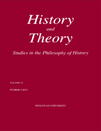
HISTORY AND THEORY
Shaping Intellectual Landscapes Through Rigorous InquiryHISTORY AND THEORY, published by Wiley, stands as a premier journal in the realms of history and philosophy, consistently recognized for its scholarly contributions since its inception in 1968. With an impressive Q1 ranking in both History and Philosophy categories for 2023, it represents the top tier of academic rigor and impact in the field. This esteemed journal, indexed under ISSN 0018-2656 and E-ISSN 1468-2303, offers a platform for innovative research and critical discourse that challenges conventional interpretations and fosters rich theoretical explorations. Despite being a subscription-based journal, its broad array of contributions plays a pivotal role in shaping intellectual discussions among researchers, professionals, and students alike. With its central hub located in Hoboken, New Jersey, HISTORY AND THEORY engages an international readership, making it an influential voice for those immersed in understanding the complex interplay of historical contexts and philosophical thought.
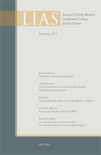
LIAS-Journal of Early Modern Intellectual Culture and its Sources
Unveiling the Rich Tapestry of Intellectual HeritageLIAS - Journal of Early Modern Intellectual Culture and its Sources is a distinguished academic journal that delves into the rich tapestry of intellectual thought from the early modern period, exploring the interplay between culture, philosophy, and literature. Published by PEETERS in Belgium, this journal serves as a vital resource for scholars and students alike, offering a platform for rigorous research and innovative perspectives in the fields of History, Literature, and Philosophy. With an ISSN of 2033-4753 and an E-ISSN of 2033-5016, LIAS has earned notable rankings in the 2023 Scopus classifications, reflecting its commitment to scholarly excellence and its growing influence within these disciplines. Although it currently does not offer open access options, it is esteemed for publishing high-quality articles that illuminate the complexities of early modern intellectual culture and its enduring impact on contemporary thought. The journal's well-curated content holds significance for researchers keen on exploring interdisciplinary approaches and contributes meaningfully to ongoing educational discourse.
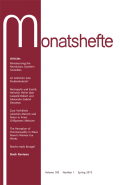
Monatshefte
Advancing Scholarly Discourse in German CultureMonatshefte is a prestigious academic journal published by the University of Wisconsin Press, dedicated to fostering scholarly discourse in the field of German Studies. With its ISSN 0026-9271 and E-ISSN 1934-2810, Monatshefte serves as a vital platform for researchers and students, offering peer-reviewed articles that delve into literature, culture, and linguistics. The journal plays an essential role in advancing knowledge and understanding of German intellectual traditions, making it indispensable for anyone interested in the dynamics of German culture. Although it is not an Open Access publication, its rigorous selection of high-quality research articles ensures its impact within the academic community. For researchers aiming to stay at the forefront of German Studies, Monatshefte provides a wealth of insights and critical analyses, fostering enhanced academic dialogue and innovation.
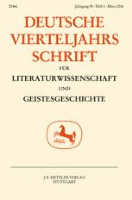
DEUTSCHE VIERTELJAHRSSCHRIFT FUR LITERATURWISSENSCHAFT UND GEISTESGESCHICHTE
Navigating the Rich Landscape of Literary Theory.DEUTSCHE VIERTELJAHRSSCHRIFT FUR LITERATURWISSENSCHAFT UND GEISTESGESCHICHTE, published by J B METZLER, is a distinguished academic journal hailing from Germany that offers a profound exploration of literature, cultural studies, and philosophy. With its ISSN 0012-0936 and E-ISSN 2365-9521, this journal has been operational since its inception in 1973, continually contributing to the intellectual discourse surrounding literary and philosophical theories. The journal holds a recognized position within the academic landscape, achieving a Q3 ranking in Literature and Literary Theory and Q4 in both Cultural Studies and Philosophy as of 2023. Although it does not currently offer Open Access options, its impact in the field is underscored by its ranking in Scopus, where it is recognized amongst a competitive cohort of journals. Aimed at researchers, professionals, and students alike, the DEUTSCHE VIERTELJAHRSSCHRIFT serves as an invaluable resource for those investigating the intersections of literature and the broader cultural milieu, fostering an understanding of the dynamics that shape literary and philosophical thought.

Anos 90
Exploring the Cultural Tapestry of Brazil's 90s.Anos 90 is a distinguished journal dedicated to the exploration of historical narratives and cultural phenomena, particularly within the context of Brazil during the tumultuous decade of the 1990s. Published by the Universidade Federal do Rio Grande do Sul as part of its Programa de Pós-Graduação em História, this open access journal has been a vital platform for scholars since 1993, encouraging the dissemination and discussion of historical research that contributes to the understanding of contemporary societal evolution. With an ISSN of 1983-201X and an E-ISSN of 0104-236X, the journal is committed to providing accessible scholarly content to a global audience, thus fostering collaborative research opportunities and academic dialogue. Despite being ranked in the fourth quartile for the History category as of 2023, Anos 90 remains an essential resource for researchers and students seeking in-depth insights into historical interpretation and analysis. The journal serves as a critical juncture for the academic community interested in delving into the complexities of a pivotal era in Brazilian history, making it a significant addition to the field of historical study.

Revue de Synthese
Fostering Critical Analyses for a Complex WorldRevue de Synthèse, published by BRILL, is a distinguished journal in the field of Philosophy, recognized for its rich academic tradition since its inception in 1950. With an impressive history of converged years and a steady commitment to philosophical discourse, the journal offers a platform for scholars to present innovative ideas and critical analyses. Although currently listed in Q4 of the 2023 category quartiles, it serves as an essential resource for those pursuing interdisciplinary studies, enriching the philosophical landscape amidst global intellectual challenges. The journal is not currently available as Open Access, making its curated content accessible through institutional subscriptions. With an ISSN of 0035-1776 and E-ISSN of 1955-2343, Revue de Synthèse aims to empower researchers, professionals, and students alike with transformative insights that advance the understanding of contemporary philosophical issues.
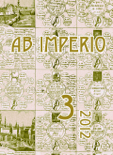
Ab Imperio-Studies of New Imperial History and Nationalism in the Post-Soviet Space
Unraveling Imperial Legacies in a New EraAb Imperio - Studies of New Imperial History and Nationalism in the Post-Soviet Space is a distinguished academic journal dedicated to exploring the complexities of imperial history and nationalism in the post-Soviet context. Published by AB IMPERIO INC, this journal, with ISSN 2166-4072 and E-ISSN 2164-9731, serves as a crucial platform for interdisciplinary research, inviting scholars to engage with the evolving narratives of the former Soviet territories. With its convergence from 2013 to 2024, the journal has established a significant presence in the academic community, earning a Q2 ranking in History and a Q3 ranking in Sociology and Political Science for 2023. The journal's commitment to scholarly rigor is evidenced by its Scopus rankings, placing it among the noteworthy publications in the arts and humanities as well as the social sciences. Although it operates without open access, Ab Imperio provides essential insights for researchers, professionals, and students alike, who are keen to comprehend the intricate dynamics of nationalism and imperial legacies in contemporary society.
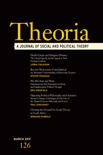
THEORIA
Unlocking the Potential of Theory in Contemporary Contexts.THEORIA is a distinguished academic journal focused on the intersection of theory and practice within the humanities and social sciences. Published by Berghahn Journals, this Open Access journal has been a pivotal platform for disseminating innovative research since 2021, ensuring that scholarly work is accessible to a global audience. With its commitment to fostering intellectual discourse, THEORIA invites contributions that critically explore diverse theoretical frameworks and their applications in contemporary societal contexts. Researchers, professionals, and students will find that the journal not only enriches their understanding but also encourages collaborative dialogue across disciplines. Explore the latest insights and developments in theoretical research, and join a vibrant community dedicated to advancing knowledge and critical thinking.

Dialog so Vremenem-Dialogue with Time
Unraveling the Threads of Intellectual HeritageDialog so Vremenem - Dialogue with Time is a prestigious academic journal published by the Russian Society for Intellectual History, focusing on the intricate interplay between historical narratives and philosophical thought. With its ISSN 2073-7564, the journal has established a significant presence in the scholarly community since its inception in 2016. It is categorized in the Q2 quartile for History and Q3 for Philosophy, reflective of its critical engagement with intellectual heritage and contemporary issues. Although not currently an open-access journal, it aims to provide valuable insights into the evolution of thought across different epochs, making it an essential resource for researchers, professionals, and students alike. The journal's contributions are recognized within Scopus, ranking at a notable percentile, which underscores its relevance and impact in the fields of Arts and Humanities. With its ongoing commitment to fostering dialogue in intellectual history, Dialog so Vremenem remains a vital platform for scholarly exchange and exploration of time’s influence on ideas.
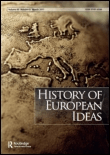
HISTORY OF EUROPEAN IDEAS
Illuminating the Intersections of History and IdeasHISTORY OF EUROPEAN IDEAS, published by Routledge Journals, Taylor & Francis Ltd, stands as a premier platform for the exploration and dissemination of scholarly research within the fields of history, philosophy, sociology, and political science. With an ISSN of 0191-6599 and E-ISSN of 1873-541X, the journal has established itself in the academic community as a Q1 journal in both History and Philosophy and Q2 in Sociology and Political Science as of 2023. Its rigorous publication standards contribute to its notable Scopus rankings, reinforcing its importance in the humanities and social sciences. Spanning from 1980 to 2024, the journal invites contributions that delve into the intricate interrelations of European ideas and their historical contexts, thus aiming to enrich academic discourse and advance knowledge in these disciplines. Although not available as Open Access, the journal’s curated content remains pivotal for researchers, professionals, and students seeking in-depth analyses and innovative perspectives on European thought.